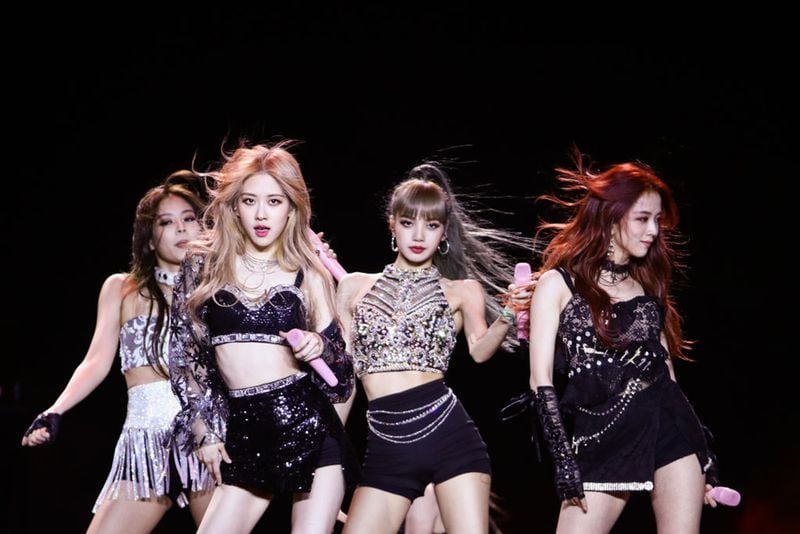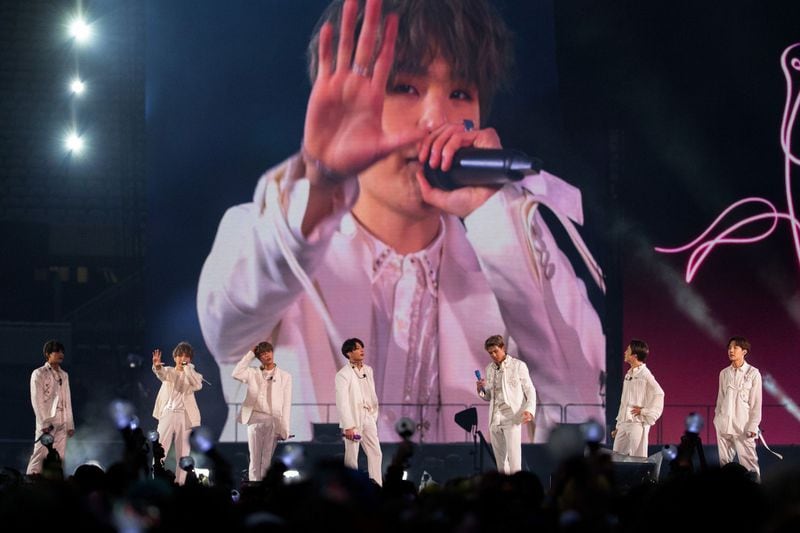
When the nine-member K-pop group first arrived at Atlanta’s State Farm Arena, it was hard for them to accept that they’d later be filling up Georgia’s largest indoor arena, one of the group’s members recalled.
According to AJC, the Feb. 24 show had sold out in hours when tickets went on sale late last year. Rabid fans decked out in the group’s merchandise packedthe arena, many holding glowingTWICE-branded lightsticks in orange, green and pink hues.
For the uninitiated, K-pop took off in the 1990s in Korea, defined as a mashup of Western musical styles — pop, R&B, hip hop — that also feature Korean cultural elements. Groups like BTS and Blackpink helped shepherd an expansion of K-pop into the America mainstream in the last few years. BTS, the uber-popular seven-member boy band, has topped the American charts and was set to play a show at Atlanta’s Bobby Dodd Stadium in May 2020 before the pandemic postponed the tour.
But other groups like TWICE, which have been popular in East Asia for years, are also starting to cross over. K-pop sub-cultures have been around in America for a while, but the genre is quickly entering the mainstream, fueled in part by the Internet, enhanced promotion from American record labels and the current lack of prominent American boy bands and girl groups.
“I feel that TWICE has gotten bigger for sure,” vocalist Jeongyeon told the crowd to deafening cheers.
TWICE’s mammoth three-hour set — filled with buoyant hits, intricately choreographed routines, pyrotechnics and three different confetti releases — was a show of force for the genre as a whole, and a service for the group’s diverse fanbase.
It’s one of the biggest K-pop shows Atlanta has ever seen, if not the biggest, and the latest sign that the global explosion of K-pop has taken hold here.
Made up of nine members — Nayeon, Jeongyeon, Momo, Sana, Jihyo, Mina, Dahyun, Chaeyoung, and Tzuyu — TWICE also has stops in Texas, New York and California on their fourth world tour, their first to come through Atlanta.
Since 2020, four of the group’s albums have charted on the U.S. Billboard 200 chart. TWICE’s first English-language single, “The Feels,” which dropped last year and opened their show, landed on the Hot 100 chart. Several songs on TWICE’s latest album, “Formula of Love: O+T=<3,” are in English.
Formed by a Korean record label through a television show in 2015, TWICE was in perfect sync as they moved through detailed dance numbers, with the members moving in and out of different formations across two stages while singing into headset microphones. Momo, Jihyo and Chaeyoung especially stood out for their stage presence.
Across 31 songs, they showed only marginal signs of fatigue, with breaks during lengthy video interludes and to speak to the crowd, both in English and in Korean, through a translator.
Fans’ relationships with their favorite artists are a defining characteristic of K-pop, which was especially clear during the speaking sections that focused on TWICE’s love for their fans — known collectively as “Once” — and vice versa. The end of the show had a more casual feel, as the singers donned T-shirts and sweatpants, spun a wheel to decide their encore set and walked around the stages interacting with fans looking on from the crowd.
That K-pop has found an audience in the Southeast is also significant given that many sounds that originated in Atlanta hip-hop and trap music have now found a place in mainstream K-pop — even in the catalog of a group like TWICE, which has a more bubblegum pop sound than many other acts.

A Pitchfork review of a TWICE album last year noted some of the group’s early hits had “beats that landed between freestyle and Atlanta bass.” During Chaeyoung’s rap on the standout track “ICON,” for example, she uses the “triplet flow” popularized by Atlanta rappers like Migos and Future. The cadence of the hook on “HELLO” is alsoreminiscent of flows common in Atlanta trap music.
It’s all yet another sign of the global impact of Atlanta’s hip-hop scene. For Crystal Anderson, a George Mason University professor who wrote the book “Soul in Seoul: African American Popular Music and K-pop,” the use of trap sounds is just the latest evolution in K-pop’s tendency to be influenced by different Black musical genres over the years.

“We’re talking soul, funk, techno, house. Now we’re seeing things like trap,” she said. “K-pop is very attuned to the kinds of music that’s popular now.”
At their State Farm Arena show, TWICE navigated between genres including bossa nova, disco and electro pop.
Deandre Quiero, 18, came from Ohio to see the show. Like the members of TWICE, he said he alsowasn’t expecting the show to be so packed.
“I don’t feel like (I’ve ever been) listening to a TWICE song and got mad,” he said. “I always have a smile on my face. They just make a lot of people happy.”